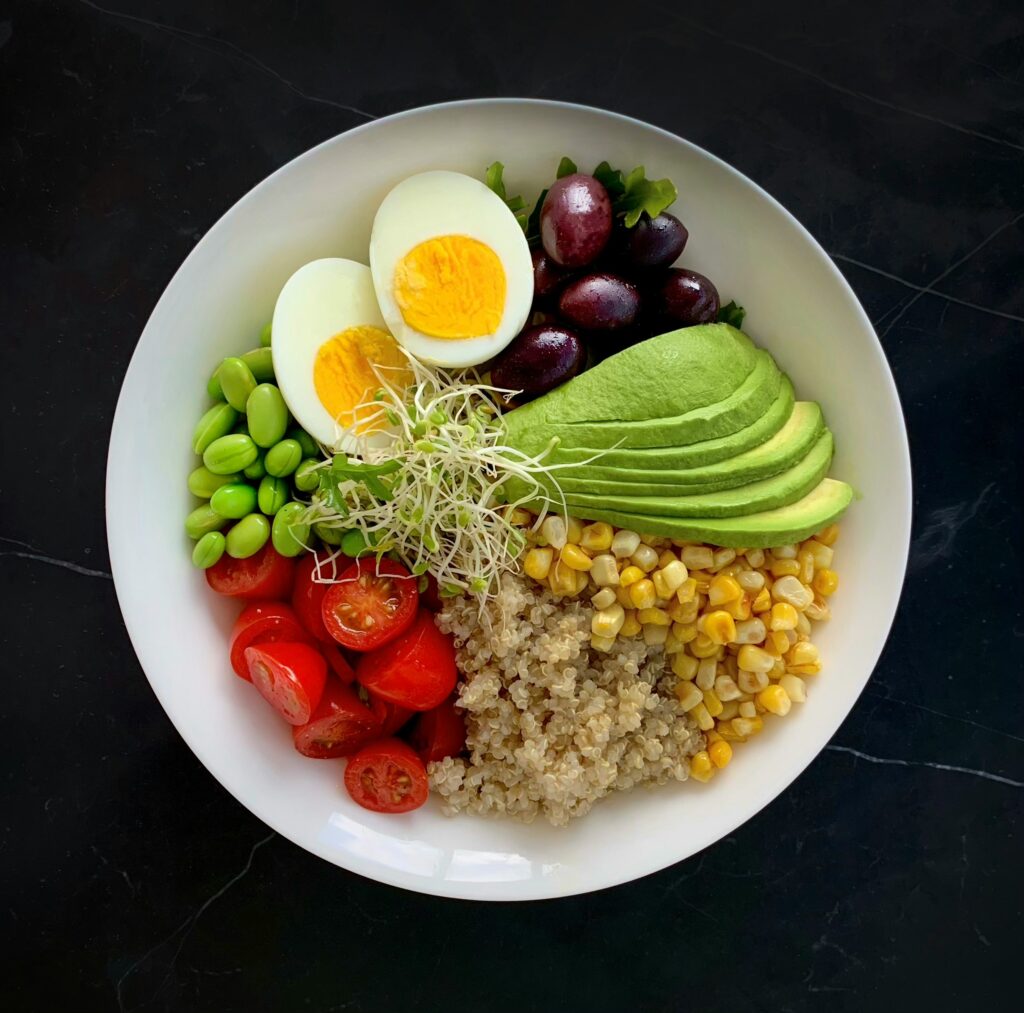One big takeaway: Probiotic supplements will not make up for a bad diet.

You’ve heard of probiotics, prebiotics and even postbiotics, all of which are making the rounds on podcast ads and in drugstores as the next frontier in gut health. They promise to keep you feeling good, handle any digestive issues, and even help maintain a positive mood.
The existence of the microbiome and the 38 trillion organisms that make it up is well-documented. Those of us who struggle with digestive issues are willing to do what it takes to make our microbiome healthier so we can feel better, and there’s no shortage of information on how to do this.
But when every gut health brand is promising that its curated solutions are the answer to your discomfort, how do you separate the hype from the science?
To help us explore what we can do to truly improve our gut health – and why we should care – we turned to Dr. Alicia Beal, a lifestyle and family medicine physician at Novant Health.
The topic is a passion for Beal, who’s eager to help patients navigate a world dominated by fad diets and processed foods.
“Every single diet you go on can cause you to lose weight. But are you a healthier person?” she said. “There are a lot of benefits to losing weight, but it can come at a real cost if your insides aren’t healthier.”
Eating more plants and having a healthy microbiome are among the best things we can do not only to live healthier, but also to live healthier longer, Beal said. We’ll let her take it from here.
What is the microbiome?
The way I explain it to my patients is that it’s the zoo you grow in your bowel. This can include bacteria, yeast, and even parasites, which you don’t want to have. There are even ancient organisms called archaea that make up the 38 trillion organisms in your gut. The goal is to have a lot of healthy bacteria and to keep out what you don’t want.
What can the average person do to keep their own gut healthy?
Let’s start with what you can do to maintain your overall health. It’s so important to use good handwashing techniques. Wash your hands before eating and avoid touching your eyes, nose or mouth with unwashed hands.
For your gut health, try to make sure what you take into your body is a healthy diet. A healthy diet encourages the type of bacteria you want.
When you eat an unhealthy diet, you encourage the growth of bacteria that are not beneficial to you. This is called dysbiosis.
What does a healthy diet look like when we’re trying to encourage healthy bacteria growth?
You’ll be eating a diet that has more plant content, and as a result, more fiber. Plants have cornered the market on fiber. Keep in mind that a diversity of plants is also important. Some plants are better than none at all, but I recommend at least 30 different plants a week in a gut-friendly diet to my patients.
Each food is built differently, and different bacteria will “eat” different foods. When you have a diverse diet, you have a diverse microbiome.
That sounds like a lot for the average person or family to pull off. What’s your advice?
I always tell my patients to do the best they can. Any number of plants is better than no plants. Remember, too, that a lot counts as a plant. If you season a dish with garlic and onion, that counts. Any fresh herbs you include in a dish count. Sunflower seeds on a salad count. Count every small win instead of trying to hold yourself to a set number every week.
What is the biggest problem that leads to poor gut health today?
Consumption of processed foods and diets heavy in animal products. Processed foods are convenient, cheap and taste good. In food deserts, they are often all that’s available. There are several reasons why someone may struggle to access healthy foods, including socioeconomic status, a lack of available time, or inadequate health education.
However, these diets can lead to constipation, leaky gut, and, over a long period of time, colon cancer. Leaky gut is a condition in which the cells that make up the bowel are not connected well. That allows toxins to invade your bowel and cause inflammation.
How do you talk to people about beginning to make dietary changes that are practical, accessible and healthy?
I just try to meet them where they are. So if they say, “I think I will eat less processed meat like pepperoni and instead eat more grass-fed beef, chicken or fish,” I will support that.
It’s important to realize that every healthy choice you make gives you something back. The bigger the change, the bigger the benefit. If you go from eating 80% animal products and 20% plant products to 60% animal products and 40% plant products, you have still improved your health.
What you do habitually matters, too. One “bad” meal will not destroy the work you’ve put into making your microbiome more healthy.
The other thing I tell new patients is to make changes slowly in the beginning if they need to. If you’re incorporating four new vegetables into your diet, your gut may not have the bacteria it needs to process that food yet.
So if you experience significant bloating and passing gas, don’t be discouraged. Eat smaller amounts of the food and let the bacteria you need to process it come on board. They will start arriving in 24 to 48 hours and begin processing the food more easily by one to four weeks. If you feed them, they will come.
On that note, can you walk us through prebiotics, probiotics and postbiotics? Where do they fit in with what you’ve told us so far?
Great question! First, let’s look at how they fit together. This is how I explain the relationship between the three: prebiotics plus probiotics equals postbiotics. That comes from Will Bulsiewicz’s book “Fiber Fueled.”
Prebiotics are the food you eat – what attracts the bacteria to join your microbiome. Those bacteria are the probiotics. When it comes to these two in a supplement or drink form, consider that if you’re taking a probiotic supplement but you aren’t eating a healthy diet, the bacteria you get from that supplement won’t survive.
Your diet has to support the bacteria you want to live in your gut. If you do the prebiotics correctly, the probiotics will follow naturally. In some people without a diverse diet, it may mean a prebiotic supplement, but actual whole food is always preferred as a source of prebiotics.
Lastly, the postbiotics are products the bacteria make for you, and this is just as important. Good bacteria produce compounds that are crucial to bowel health. These compounds – short-chain fatty acids – also help you by decreasing inflammation in specific organs and improving the function of your blood vessels.
When you have unhealthy bacteria, your postbiotics can lead to the production of compounds that contribute to the formation of atherosclerotic plaques, which consist of fats, cholesterol and other substances, on your artery walls.
Ultimately, if you’re trying to maintain your gut health with these three factors – prebiotics, probiotics and postbiotics – a healthy diet is what’s most important. In other words, I’ll just say it’s hard to counteract a full day of poor living with a couple of supplement capsules.
Let’s pivot to consider the gut in a broader context. I hear people talk a lot about how certain foods can improve their mood. Is that possible?
Yes. The gut-brain axis is simply the scientific term used to describe the nerve cells that connect the gut and the brain. We know that when people eat better, their mood gets better, and concentration increases while anxiety decreases. So one part of this is just getting the nutrition you need.
However, your gut does have millions of known nerve cells that communicate with other parts of the body through neurotransmitters like dopamine and serotonin, both of which are produced in the gut, as well as hormones.
A good example of how the gut-brain axis can directly affect you is serotonin. About 90% of serotonin is produced in the gut, and when you have a healthy microbiome, you produce enough serotonin. This supports your ability to move food through your digestive system properly, and it can also affect your appetite, mood, sleep and even your brain function.
I will say that when it comes to food, we know that if a person with a poor diet eats just one extra serving of a fruit and veggie each day, it will lead to a decrease in anxiety in just two weeks. However, if the goal is to achieve generally better health, it’s all about having a diverse, well-rounded, high-fiber diet.
What should someone do if they suspect they have a gastric issue? Are there any symptoms that are signs that something is wrong?
Absolutely. So severe abdominal pain, bloody stools and excessive diarrhea are a few that come to mind. It’s essential to understand that diarrhea isn’t simply having soft stool every day. We’re referring to multiple watery stools when we use the term diarrhea.
Diarrhea is especially concerning if you’re losing weight despite eating normally. Severe constipation, a sudden change in bowel function, throwing up black contents from the stomach, or having a black, sticky stool should also be signs to either see your doctor or seek immediate medical help.
Leave a Comment
Please note: This site is not for personal medical questions. Those need to be answered by your medical provider.






